- Home
- Jack Canfield
Chicken Soup for the Ocean Lover's Soul Page 8
Chicken Soup for the Ocean Lover's Soul Read online
Page 8
Michael Geers
Goddess
I recently took my oldest daughter Maya to our local beach to swim and play. She’s four years old, and naturally her questions have become more thoughtful and profound. At the beach she asked—without any prompting from me—”God made us, huh?” We had been working on a sand castle when she said this. I smoothed away loose sand from our castle and took a deep breath, frightened, really, to mess up this answer .
I considered myself spiritual, but by no means religious. I believe in compassion, giving your all and doing right by yourself, others and the Earth. The religious symbolism I allow in our house is defined by our Afro-Caribbean culture. I have a shelf—some call it an altar—covered with candles, pictures of saints, shells, a coconut, coins, feathers and beaded necklaces. These things are important definers of who we were as Puerto Ricans, but for the most part they have remained a mystery to Maya. Now she is getting old enough to ask for some explanation.
Before she lost interest, I said, finally, “Yes, Baby, God made us.”
That was all I could come up with—a simple answer to a simple question.
“How did she do that?”
She? I thought. “Well,” I said, “there are a lot of stories about how she did that. Some say she molded people out of the Earth and breathed life into them. And some say that a long, long time ago before dinosaurs were around she made tiny animals first that eventually turned into people.”
“Turned into people?”
“After a really long time, yeah, the animals evolved into people.” Impressively, I knew she understood that word because she once told me that Pokémon evolve.
“Will Puffy [our cat] evolve into a person?”
“Probably not,” I laughed. “It takes a really long time if that were to ever happen again.”
“Is God a boy or a girl?”
“I think God is both, Baby.”
“Spencer says God is a boy!” She said this with a tone revealing the audacity of Spencer, one of her classmates. I tried to imagine preschoolers discussing religion on the monkey bars or around the water fountain.
“It’s okay that Spencer thinks that,” I said.
“Oh,” she answered, sounding a bit defeated that maybe Spencer had won a minor victory.
“I think,” I said gingerly, “that God is, and looks like, all things in nature.”
“Everything?”
“Sure. The sun, the flowers, plants.” I pointed to the water. “The ocean.” Her eyes followed my hand. “Some say that the ocean is a girl god.” Her face brightened. I was offering her the first introduction to a religion that our great-great-grandparents most likely practiced with great passion, as if their identity depended on it. I was proud and scared, praying I would present it right.
“Her name is Yemaya,” I said.
“Maya?” she giggled.
“YE-ma-YA,” I said again.
Maya seemed pleased. She looked at the ocean again. A small wave broke and rolled. Slowly, it spread a thin layer of water over the dark sand. “Yemaya,” she repeated.
“Yemaya is a goddess. That’s what they call a girl god. She’s the goddess of the ocean that is part of a bigger God that made us. She is strong and beautiful. She takes care of a lot of people, but sometimes she can destroy things, too.”
I watched Maya’s face, wondering how she was processing this story. I wanted to believe that it hit her someplace where spirituality and myth are the same. Then my beautiful, bright, yet still four-year-old asked, “Do you think Yemaya likes to wear pink dresses?”
I laughed again.
“I think maybe white and blue dresses,” I said. “They say she likes those colors.”
“Not pink? How about purple?”
“Maybe purple.” What was I going to say, that Yemaya doesn’t like purple?
“Mami?” I thought for sure Maya would go on to ask about every color dress and whether Yemaya liked them or not, but instead she said quietly, “If God looks like Yemaya, can God even look like me?”
I tried to remember something Maya Angelou had once said—after all I had named Maya after her—about the power and importance of the ocean. I couldn’t remember the exact quote because all that overcame me was that Maya, my Maya, was just as powerful and important as the ocean to me. And I said to her, wiping salty water from my face, “Yes, baby, certainly God looks like you, too.”
Danette Rivera
The Guide
Many years ago, my dad and I were driving back to my home on the north shore of Oahu when we noticed a large white albatross tied to a small fruit stand next to the Kamehameha Highway. Near the bird stood a local Tongan man. I pulled to the side of the road and asked the man what he thought he was doing. “These birds are protected in Hawaii,” I said. “Did you know that?”
The man didn’t seem to care. He said the bird helped to draw tourists. To him, it was nothing more than a photo opportunity for anyone who drove by. I did my best to convince him this was wrong, how the albatross was a wild animal that depended on access to the sea for food. To a bird that is capable of flying hundreds of miles in a day, I could imagine no worse torture than being lashed to a structure on the side of a road.
After an hour of negotiation, the man reluctantly released the bird to me. In turn, I handed it over to my neighbor, a local expert known around the North Shore as the bird lady. She agreed to care for the albatross until it could recover enough for release back into the wild.
After a few days, the albatross looked healthier and seemed strong enough to fly. We had done all we could; the rest was up to the bird. We took it to the beach at Kewela Bay, where it tried several times to take off. After the third try, it caught a gust of wind, and with a beat of its wings, took to the air. As clumsy as they are on land, there is nothing more beautiful than the sight of a soaring albatross, and I have to admit we were all moved at the sight of this bird returning to the wild. It quickly gained altitude, and just when we thought we had seen the last of it, it banked suddenly, and in a graceful turn, swept over our heads in what I liked to think of as a final good-bye.
Ten years later, I was scheduled to return to the mainland for a series of gallery shows. As I made my preparations to leave, I had to move my small zodiac boat from its mooring in front of my house to Haleiwa harbor. My friend Gary offered to drive my pick-up truck with the boat trailer to the boat ramp in Haleiwa, while I drove the boat to meet him a half-hour later. Gary left with the trailer, and I waded out to the boat to get started.
My timing couldn’t have been worse. A winter swell was growing offshore. The waves seemed manageable at first, but within minutes I was battling enormous swells. The boat was hammered from every direction. Turning back would have been useless, not to mention even more dangerous. My only option was to race for the horizon and hope for the best. I gunned the engine toward the outer reefs, but the swells kept coming, as if God had grabbed the ocean like a blanket and was shaking it violently.
The North Shore is known for some of the largest waves in the world, and this was as big as I’d seen it in twenty years. To make matters worse, I had forgotten to bring a life preserver. If a wave washed me from the boat, I was done for. Wave after wave pounded the boat, each wave getting bigger, and each time the boat seemed to barely make it over. I had lost all sense of direction and began to consider the very real possibility of getting killed, when out of nowhere a great albatross swooped past the bow of the boat, its great wings dipping from side to side as it latched onto a current of air less than twenty feet in front of me.
The bird soared between the swells, navigating toward an area of calm. I, too, felt a sudden calm come over me. The fact that I was no longer alone filled me with the hope that I might survive this after all. All I could do was put my trust in the bird’s instincts and its knowledge of the unforgiving sea. For two hours, the amazing bird not only stayed with me, but actually led me into the safe harbor, then banked gently and turned toward the hori
zon until it disappeared from sight.
Wyland
Octopus’s Garden
We cannot have peace among men whose hearts find delight in killing any living creature.
Rachel Carson
When I moved to Maui to marry the Captain of my heart, one of the marriage requirements was that I learn to scuba dive—as that was his first love. If I were to fit in, this ocean of his and I were just going to have to get along! Luckily for me—and us—I already had an ongoing love affair with the sea, both for its beauty and its creatures, so I embraced this opportunity to dive and explore the world below the surface.
There were a few differences between the way my fiancé and I approached the sea, however. Having been a fisherman for many years, he didn’t think twice about taking the ocean’s bounty home for dinner. In fact, he had told me how the Hawaiians had taught him to kill an octopus by biting it right between the eyes, then taking it home to eat. Useful information, I’m sure, but all it did for me was offer proof that the worst gift one could have was to be born delicious.
I, on the other hand, had been a vegetarian for over twenty years. I wasn’t the kind of vegetarian who concerned herself with what other people ate, but I preferred, when given the option, not to participate in or witness the death of any creature.
One day, when we were exploring the waters off the coast of Maui, we happened across an octopus’s garden. Romantically, the Beatles’ song of the same name started playing in my head. The Captain had different tunes playing in his head, and they must have sounded like dinner bells, because after catching the octopus and showing me its spectacular array of arms and suction cups, he paused. I could see on his face that this was a very difficult moment.
As he held the octopus, visions of the Captain biting the head of this multiarmed creature flashed through my mind. I imagined the arms—now so full of life and movement— falling limp at the hands of my beloved. My emotions must have shown in my eyes, the only part of my face visible behind mask, regulator and a steady stream of bubbles.
Still holding the giant octopus in his hands as it reached out in every direction to get away, the Captain looked at me, then looked at the octopus. He was obviously in the grip of one of the major decisions of his life: Did he want to take the octopus home for dinner or take the girl home for life? He must have realized that this could be the deal breaker and, ever so reluctantly, he opened his hand and let the octopus go. As they parted each other’s company, it was clear that the octopus and the Captain both celebrated their new lease on life.
Evidently, the Captain never forgot the moment, either. On our ten-year wedding anniversary, he graced me with a beautiful, silver necklace of an eight-armed beauty of the sea in honor of the octopus that saved our relationship.
Eve Eschner Hogan
CALVIN AND HOBBES © Watterson. Reprinted with permission of UNIVERSAL PRESS SYNDICATE. All rights reserved.
I Found a Tiny Starfish
I found a tiny starfish
In a tide pool by the sand.
I found a tiny starfish
And put him in my hand.
An itty-bitty starfish
No bigger than my thumb,
A wet and golden starfish
Belonging to no one.
I thought that I would take him
From the tide pool by the sea,
And bring him home to give to you
A loving gift from me.
But as I held my starfish,
His skin began to dry.
Without his special seaside home,
My gift to you would die.
I found a tiny starfish
In a tide pool by the sea.
I hope whoever finds him next
Will leave him there, like me!
And the gift I’ve saved for you?
The best gift I can give:
I found a tiny starfish,
And for you, I let him live.
Dayle Ann Dodds
Submitted by Courtenay Mayes, age 12
After the Beach
We were traveling as we often do on Sundays, looking for places for the children to play, when we found a beautiful, abandoned stretch of beach. The day was glorious. I brought a book, a novel about castles and kings, so that I might sit and read in my “matureness” while the children frolicked like untethered colts. But this time something in their playfulness stirred me to put the book down.
I moved closer to see what they were up to. My eldest daughter was building her own castle close to the water line and calling it the Taj Mahal. She moved giant buckets of sand to build it higher, and I laughed at her vain attempts to get the family dog employed in digging at just the right spot. My youngest daughter asked if I wanted to join her and, like an excited new friend, I quickly agreed. We worked on a piece of monolithic proportion. I likened it to a lost Mayan temple, but she wanted it to be the home of a magical princess called Leah, who hid in the far sand tower and could only be seen by her.
As the sun set, we gave our castles a rest and enjoyed the last hours of a fragrant summer day, until the sudden oncoming tide sent us back to building. My youngest tried to complete the tunnel outside her temple before the ocean struck. But it was too late. The water was upon us and, with dusk approaching, we gave up. The time to leave had arrived. The children moaned and asked to stay a little longer. Their father was firm in his plans to leave until I protested a little, too. So we lingered there on our little stretch of beach and watched the waves roll for a few moments more.
We talked about getting a better contractor for the next family sand mansion and which of the five remaining towers the princess might be hiding in. We whooped and aahed as the ocean waves crept over our Taj Mahal. We marveled at a power much greater than ourselves that moved the tides on this planet and in our lives. I explained that these were the tides that brought Father from faraway England and Mother’s ancestors, full of faith and hope, to this new land long ago.
A few tourists passed, but I no longer worried about my appearance. I imagined the adults looking longingly as they saw my sandy arms and legs. I bet they secretly wished they had a child within them that would help them build pyres to the sun, castles of invisible princesses and sacrifices to the waves. We watched as the whole kingdom was swallowed and returned to the sand, to await the dreams of another builder, another time. My youngest brought home a bucket of sand where the princess was hiding. “She’s going to live under our rosebushes from now on,” she said.
We stopped for ice cream on the way home. The man at the store remarked how young I looked, but it’s what I felt that was so delicious: young again and full of wonder. The next morning, taking my coffee out on our sun deck, I nearly tripped over a tiny pair of sandy shoes. It should have annoyed me, but it didn’t. My bones may have ached, but I was happy. As I watched the sun rise, my husband joined me. “I creak,” I said to him. He shook his head. “No,” he said softly, touching my sunburned nose, “you glow, my little sand queen. You glow.”
Nancy V. Bennett
ZIGGY © ZIGGY AND FRIENDS, INC. Reprinted with permission of UNIVERSAL PRESS SYNDICATE. All rights reserved.
Sea Dog
It was in the busy industrial seaport of Kaohsiung, Taiwan, that Chung Chin-Po, captain of the oil tanker Insiko 1907, received an unexpected gift from a friend: a two-week-old terrier puppy to accompany him on his long voyages. Honored, the captain named the puppy Hok-Get, a Taiwanese word meaning happiness, blessings and good fortune—qualities he hoped the little dog might somehow bestow upon the Insiko and its crew.
It soon seemed that the captain was right. Life at sea could be very lonely, and for the next two years the frisky little dog provided a happy diversion and faithful companionship for the ship’s crew. She scampered about the constantly rolling ship and was soon traversing the stairwells and gangways from the bridge down to the engine room. She learned where to hide below deck when the swells churned, and when the weather was calm she went above deck to
chase seagulls and take afternoon naps. It seemed that things couldn’t have gotten any better aboard the Insiko.
Then, as the ship crossed the South Pacific, a fire swept through the Insiko, killing one crewman, injuring another and gutting the entire engine room. All power and communications were lost. The ship was at the mercy of the currents. For twenty-one days, Chin-Po and his crew huddled on the deck searching for passing vessels, until a passing cruise ship, the Norwegian Star, spotted them and transferred the starving crew to safety.
But the rescue ship had overlooked one member of Insiko during the confusion of the rough-seas transfer— the little dog, Hok-Get. By the time Captain Chi-Po and the others realized the mistake, it was too late to turn back. Hok-Get had been abandoned to the fate of the sea. Her prospects for survival were grim and might have been even worse had it not been for a tourist aboard the Norwegian Star who later reported the faint barking of a dog as the ship pulled away from the crippled Insiko.
The next day, when the Norwegian Star stopped in Lahaina, Maui, the story of the little dog left behind found its way into the media spotlight. Flooded by donations from the public, the Hawaiian Humane Society launched a $50,000 effort to rescue Hok-Get. The air-and-sea search spanned three days and covered 14,800 square miles, but with no sign of the vessel, the Insiko was presumed sunk, and the rescue effort was called off. The Humane Society declared Hok-Get lost at sea.
A week later, the fishing vessel Victoria City made radar contact with an unidentified ship about 400 nautical miles south of the island of Kauai. The description to the Coast Guard of “a darkened ship with no lights that appeared to be adrift” matched that of Insiko. Once again the Humane Society was bombarded by requests and donations from animal lovers from the United States, South Africa, Great Britain, Canada and Brazil. The search to find the Insiko and Hok-Get was resumed. Once again the rescue teams were unable to relocate the drifting vessel.

 Chicken Soup for the Nurse's Soul: Second Dose
Chicken Soup for the Nurse's Soul: Second Dose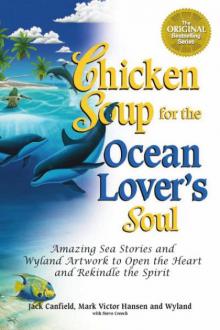 Chicken Soup for the Ocean Lover's Soul
Chicken Soup for the Ocean Lover's Soul A 2nd Helping of Chicken Soup for the Soul
A 2nd Helping of Chicken Soup for the Soul Chicken Soup for the Nurse's Soul
Chicken Soup for the Nurse's Soul Chicken Soup for the Breast Cancer Survivor's Soul
Chicken Soup for the Breast Cancer Survivor's Soul Chicken Soup for the Pet Lover's Soul
Chicken Soup for the Pet Lover's Soul Chicken Soup for the Bride's Soul
Chicken Soup for the Bride's Soul A Chicken Soup for the Soul Christmas
A Chicken Soup for the Soul Christmas Chicken Soup for the Soul of America
Chicken Soup for the Soul of America Chicken Soup for the Teenage Soul on Tough Stuff
Chicken Soup for the Teenage Soul on Tough Stuff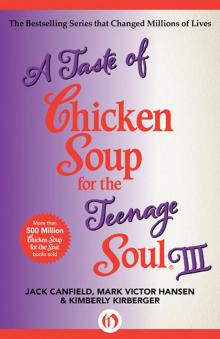 A Taste of Chicken Soup for the Teenage Soul III
A Taste of Chicken Soup for the Teenage Soul III Chicken Soup for Every Mom's Soul
Chicken Soup for Every Mom's Soul Chicken Soup for the Dog Lover's Soul
Chicken Soup for the Dog Lover's Soul A Second Chicken Soup for the Woman's Soul
A Second Chicken Soup for the Woman's Soul Chicken Soup for the Soul the Book of Christmas Virtues
Chicken Soup for the Soul the Book of Christmas Virtues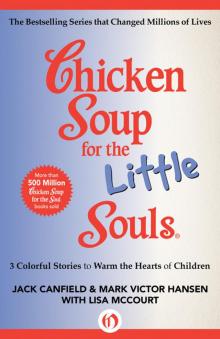 Chicken Soup for the Little Souls: 3 Colorful Stories to Warm the Hearts of Children
Chicken Soup for the Little Souls: 3 Colorful Stories to Warm the Hearts of Children Chicken Soup for the African American Woman's Soul
Chicken Soup for the African American Woman's Soul Chicken Soup for the Soul
Chicken Soup for the Soul Chicken Soup for the Soul Celebrates Teachers
Chicken Soup for the Soul Celebrates Teachers Chicken Soup for the College Soul
Chicken Soup for the College Soul Chicken Soup for the Recovering Soul Daily Inspirations
Chicken Soup for the Recovering Soul Daily Inspirations Chicken Soup for the Soul Celebrates Sisters
Chicken Soup for the Soul Celebrates Sisters Chicken Soup for the Dieter's Soul
Chicken Soup for the Dieter's Soul Chicken Soup for the Soul at Work 101 Stories of Courage
Chicken Soup for the Soul at Work 101 Stories of Courage Chicken Soup for the Beach Lover's Soul
Chicken Soup for the Beach Lover's Soul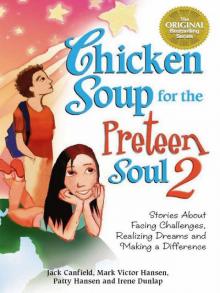 Stories About Facing Challenges, Realizing Dreams and Making a Difference
Stories About Facing Challenges, Realizing Dreams and Making a Difference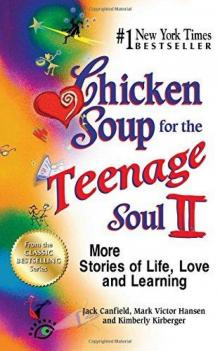 Chicken Soup for the Teenage Soul II
Chicken Soup for the Teenage Soul II Chicken Soup for the Girl's Soul
Chicken Soup for the Girl's Soul Chicken Soup for the Kid's Soul: 101 Stories of Courage, Hope and Laughter
Chicken Soup for the Kid's Soul: 101 Stories of Courage, Hope and Laughter Chicken Soup for the Woman's Soul
Chicken Soup for the Woman's Soul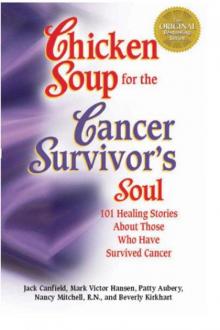 Chicken Soup for the Cancer Survivor's Soul
Chicken Soup for the Cancer Survivor's Soul Chicken Soup for the Canadian Soul
Chicken Soup for the Canadian Soul Chicken Soup for the Military Wife's Soul
Chicken Soup for the Military Wife's Soul A 4th Course of Chicken Soup for the Soul
A 4th Course of Chicken Soup for the Soul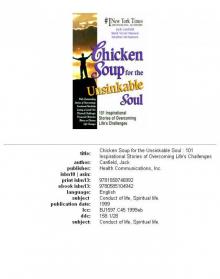 Chicken Soup Unsinkable Soul
Chicken Soup Unsinkable Soul Chicken Soup for the Soul: Christmas Magic
Chicken Soup for the Soul: Christmas Magic Chicken Soup for the Grandma's Soul
Chicken Soup for the Grandma's Soul Chicken Soup for the Soul: All Your Favorite Original Stories
Chicken Soup for the Soul: All Your Favorite Original Stories Chicken Soup for the Expectant Mother's Soul
Chicken Soup for the Expectant Mother's Soul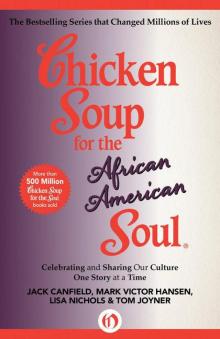 Chicken Soup for the African American Soul
Chicken Soup for the African American Soul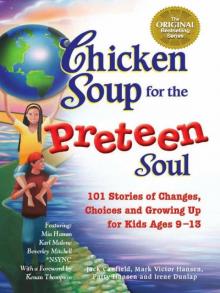 101 Stories of Changes, Choices and Growing Up for Kids Ages 9-13
101 Stories of Changes, Choices and Growing Up for Kids Ages 9-13 Christmas Magic
Christmas Magic Chicken Soup for the Soul: Children with Special Needs
Chicken Soup for the Soul: Children with Special Needs Chicken Soup for the Soul: Country Music: The Inspirational Stories behind 101 of Your Favorite Country Songs
Chicken Soup for the Soul: Country Music: The Inspirational Stories behind 101 of Your Favorite Country Songs Chicken Soup for the Country Soul
Chicken Soup for the Country Soul Chicken Soup for the Recovering Soul Daily Inspirations (Chicken Soup for the Soul)
Chicken Soup for the Recovering Soul Daily Inspirations (Chicken Soup for the Soul) A 3rd Serving of Chicken Soup for the Soul
A 3rd Serving of Chicken Soup for the Soul The Book of Christmas Virtues
The Book of Christmas Virtues Chicken Soup for the Soul at Work
Chicken Soup for the Soul at Work Chicken Soup for the Soul 20th Anniversary Edition
Chicken Soup for the Soul 20th Anniversary Edition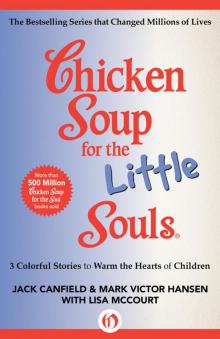 Chicken Soup for the Little Souls
Chicken Soup for the Little Souls Chicken Soup for the Soul: Reader's Choice 20th Anniversary Edition
Chicken Soup for the Soul: Reader's Choice 20th Anniversary Edition Chicken Soup for the Soul Christmas
Chicken Soup for the Soul Christmas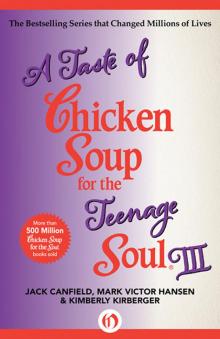 Taste of Chicken Soup for the Teenage Soul III
Taste of Chicken Soup for the Teenage Soul III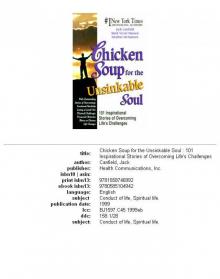 Chicken Soup for the Unsinkable Soul
Chicken Soup for the Unsinkable Soul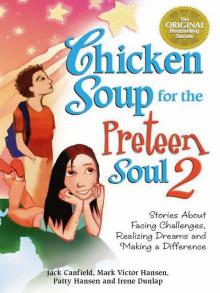 Chicken Soup for the Preteen Soul II
Chicken Soup for the Preteen Soul II